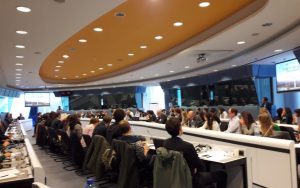High medicine prices is a key public health challenge in Europe and Trade policy – an exclusive EU competence can improve or exacerbate the situation. Free Trade and Investment agreements can make easier or harder for European governments to change existing policies to curb the costs of pharmaceuticals. Following a civil society dialogue meeting with EU Trade Commissioner Cecilia Malmström, the author is calling for policy between public health and trade goals on medicines, giving a priority to population health
By Zoltán Massay-Kosubek *
Policy Manager for Health Policy Coherence at the European Public Health Alliance (EPHA)
How Can EU Trade Policy Ensure Equitable Access to Medicines?
 6th October 2017 Civil Society Dialogue with Commissioner Cecilia Malmström on Trade and Sustainable Development
6th October 2017 Civil Society Dialogue with Commissioner Cecilia Malmström on Trade and Sustainable Development
Policy coherence is needed between health and trade policies on medicines
The pharmaceutical sector is significant for both international trade and public spending. An OECD report[1] estimates that EU pharmaceutical spending amounted to around €190 billion in 2010, almost 1.5 % of gross domestic product (GDP).
The Doha Declaration[2] on the WTO Agreement on Trade-Related Aspects of IPRs (TRIPs)[3] and public health adopted on 14 November 2001 recognises concerns over the relationship between protection of Intellectual Property Rights (IPRs) and the impact on medicine prices. The EU’s global health strategy of 2010[4] states that the EU’s trade policy should ensure more effective use of the TRIPs – provisions to increase the affordability and accessibility of medicines.
The 32nd Session of the UN Human Rights Council adopted a resolution in July 2016 highlighting the correlation between patent-based monopolies or exclusivities and the challenges in accessing affordable medicines across the globe.
In November 2015, the UN Secretary-General Ban Ki-Moon launched a High-Level Panel on Access to Medicines (UN HLP) to “review and assess proposals and recommend solutions for remedying the policy incoherence between the justifiable rights of inventors, international human rights law, trade rules and public health in the context of health technologies.” The Panel collected contributions[5] from interested stakeholders and it was supported by an Expert Advisory Group consisting of 16 members, from the public and private sector, academia, professional and civil society organisations, serving in their private capacity. In September 2016, the UN HLP published its final report[6] which calls for public health assessments to be done as part of every free trade negotiation to assess the possible impact on public health and for the creation of public health patentability criteria. It also encourages the use of TRIPS flexibilities and calls on governments to create an enabling legal environment for issuing compulsory licenses. It states that the cost of R&D should be delinked from end prices to promote universal access and that new and additional models for financing and rewarding public health research and development should be implemented.
The EU is at crossroads – how sustainable is the EU Trade Policy?
The EU has considerable global trade power and it aims to put emphasis on the sustainable aspects of its trade policy. This is why EU free trade agreements (FTAs) systematically contain chapters dedicated to sustainable development. However, the glass is half empty: while the aim is good those chapters historically are limited to only two aspects: environmental and labour sustainability. This approach seems to be outdated especially now that health sustainability is key part of the Sustainable Development Goals (SDGs) and the EU trade policy simply cannot afford to neglect those health aspects. This is what I have stressed during the 6th October 2017 civil society dialogue meeting with Commissioner Malmström.
VIDEO 1 statement on the health sustainability of the EU Trade Policy
URL https://youtu.be/dMEVc05ElTI
Background – EU Trade Commissioner Malmström with civil society
As part of an ongoing process of Civil Society Dialogue on EU trade policy, Commissioner Malmström has presented current developments and had an exchange views with civil society organisations on Trade and Sustainable Development (TSD) on 6th October. The Commission is undertaking comprehensive discussions with the Council, EP and stakeholders with a view to improve implementation of TSD chapters in the EU’s FTAs. It follows the Commission’s recent reflection paper on harnessing globalisation, which underlined the EU’s commitment to a fair, international, rules-based order based on high standards, cooperation and strengthening of multilateral institutions. The Commission is committed to include TSD chapters in trade agreements to reflect the EU’s value-based trade agenda.
How can EU Trade Policy cement an insurmountable barrier to equitable access to medicines?
IPRs are crucial for research and innovation but if they are misused they can seriously compromise equitable access to medicines by keeping medicine prices at exorbitant high level without proper justification. High medicine prices are not only relevant for the Global South but also for Europe. In the EU, Sofosbuvir, a medicine used to treat Hepatitis C, is a real-life example of the challenge of high medicine prices in Europe. While the 12-weeks treatment course is priced at €41,680 to the French Social Security system, the Indian, generic version is sold at only €220.[7]
Equally, the fact that IPRs are protected in many of the EU’s current and future deals, shows a failure to recognise concerns regarding the impact IPRs have on medicine prices. IPR acts as an insurmountable barrier to equitable access to medicines, by granting monopolies to a given medicine, meaning that other, cheaper, generic versions of the same medicines cannot be placed on the market until the patent protection exists, which drives up prices. It is very difficult to change patent processes once they are locked into international trade agreements.
Closing our eyes does not solve the problem
In her answer, the Commissioner while confirmed her commitment to health, she preferred including health elements throughout the agreement, mentioning food safety as an example. However, this should not be used as an excuse not to have health elements in the sustainable development chapter. Sustainability cannot be reduced to environment and labour. If EU FTAs remain blind to the link between IPR and high medicine prices, EU trade policy will maintain the current, ineffective and costly R&D system rewarding new medicines with fixed-term patent related market- and data exclusivities. If health sustainability aspects are properly managed, EU trade policy can contribute to the creation of an R&D system that is driven by public health needs and delivers medicines that are universally accessible and affordable.
Video 2 Commissioner Malmström’s answer to my statement on health sustainability of EU Trade policy
URL https://youtu.be/FAX0Xiu-IA8
Conclusions – business as usual is not an option anymore
If health sustainability aspects remains under the carpet, and EU trade policy will be limited to environment and labour aspects only, we do risk that FTAs will lock Europeans and their negotiating partners into a system which allows pharmaceutical companies to charge patients and health services exorbitant prices for medicines that bear no relation to their R&D costs, and fails to address priority health needs.
——————————————-
*Zoltán is Policy Manager for Health Policy Coherence at the European Public Health Alliance (EPHA) and he is responsible for the effective implementation of the Health in All Policies legal principle in various EU policies. Zoltán leads EPHA’s ‘Trade for Health’ campaign. A Hungarian qualified lawyer with strong commitment to public interest, he has over 12 years of experience including international and European affairs management matters at the Ministry of Health of Hungary, lawyer-linguist experience at the European Court of Justice, and legal practice at national courts
[1] http://www.oecd-ilibrary.org/social-issues-migration-health/health-at-a-glance-europe-2012/pharmaceutical-expenditure_9789264183896-55-en;jsessionid=1qbplkkksa36h.x-oecd-live-03
[2] https://www.wto.org/english/thewto_e/minist_e/min01_e/mindecl_trips_e.htm
[3] https://www.wto.org/english/tratop_e/trips_e/t_agm0_e.htm
[4] https://ec.europa.eu/europeaid/sites/devco/files/communication-eu-role-in-global-health-com2010128-20100331_en.pdf
[5] http://www.unsgaccessmeds.org/list-of-contribution/
[6] http://www.unsgaccessmeds.org/final-report/
[7] http://hepcoalition.org/news/press-releases/article/hepatitis-c-gilead-patent-on-sofosbuvir-partially-maintained-following-mdm
